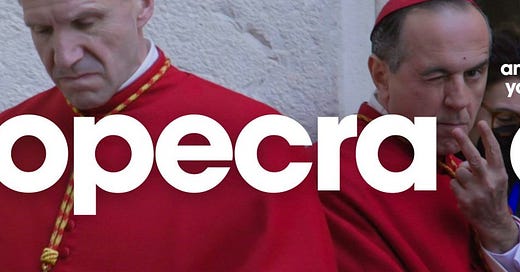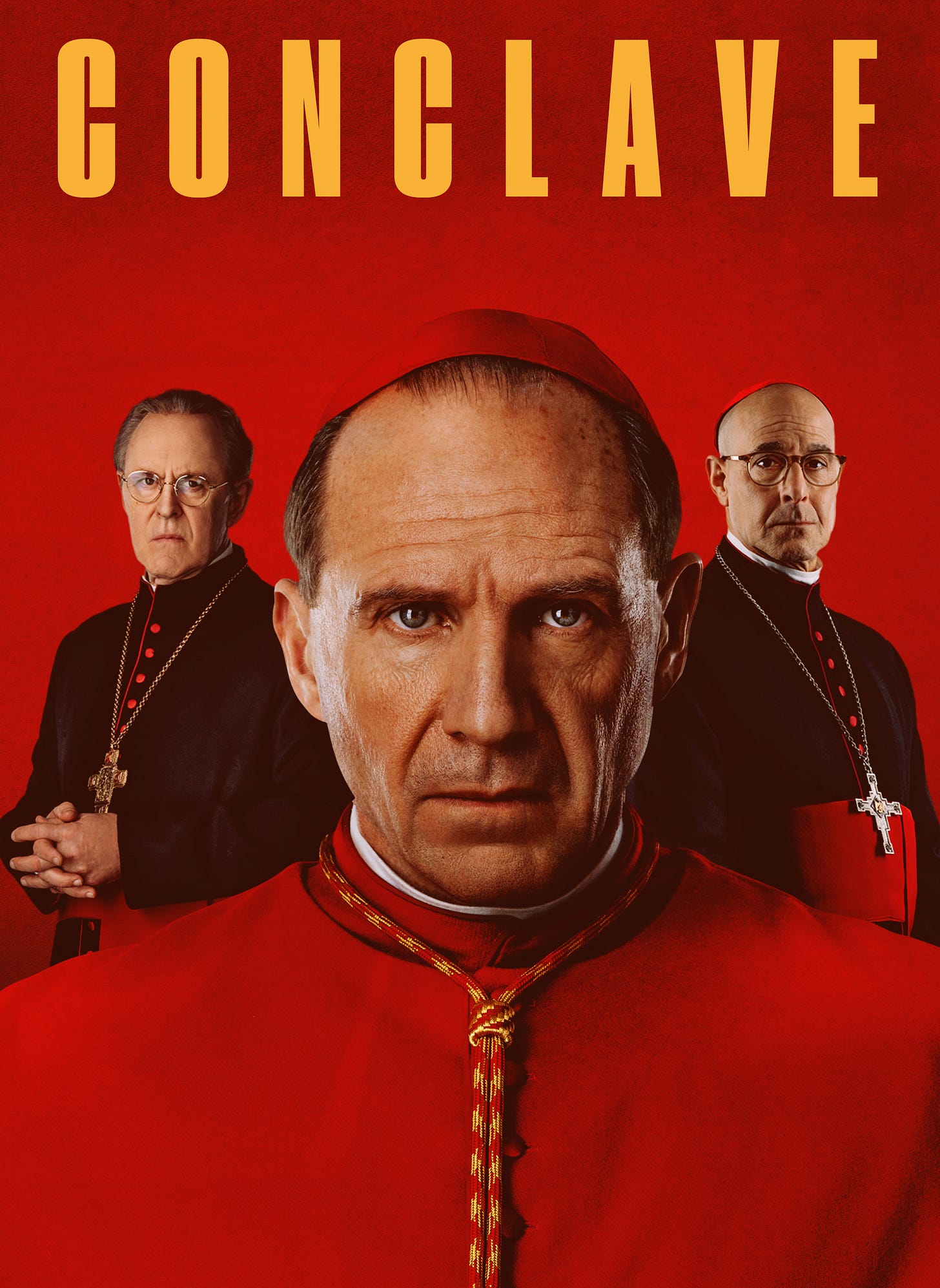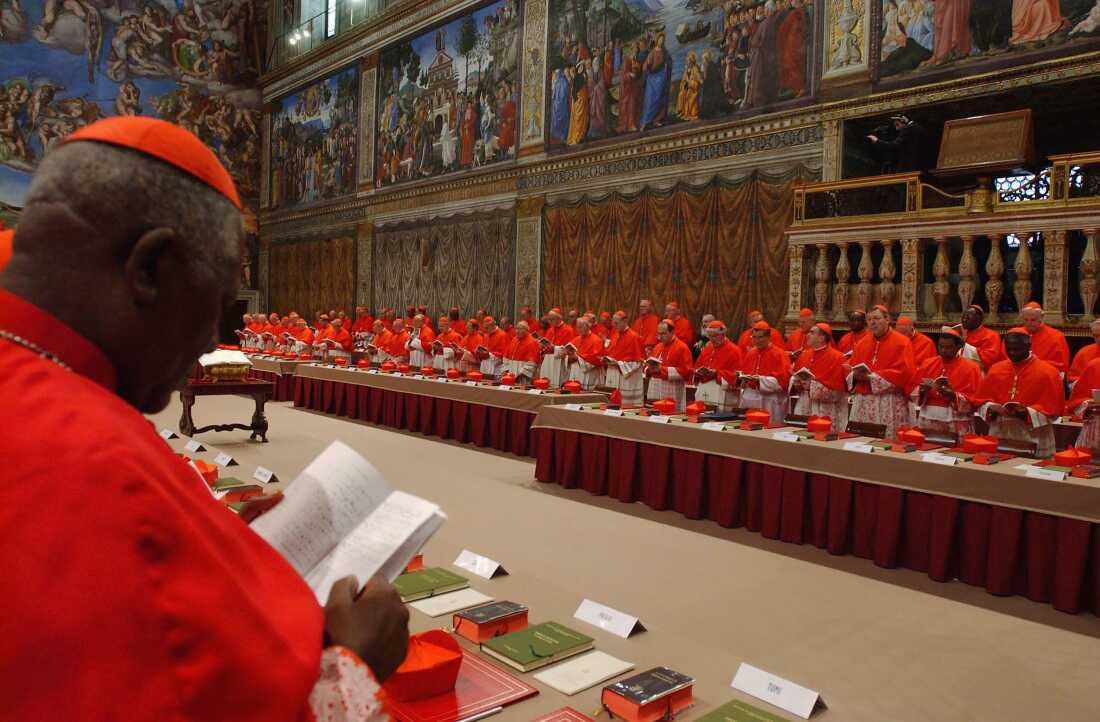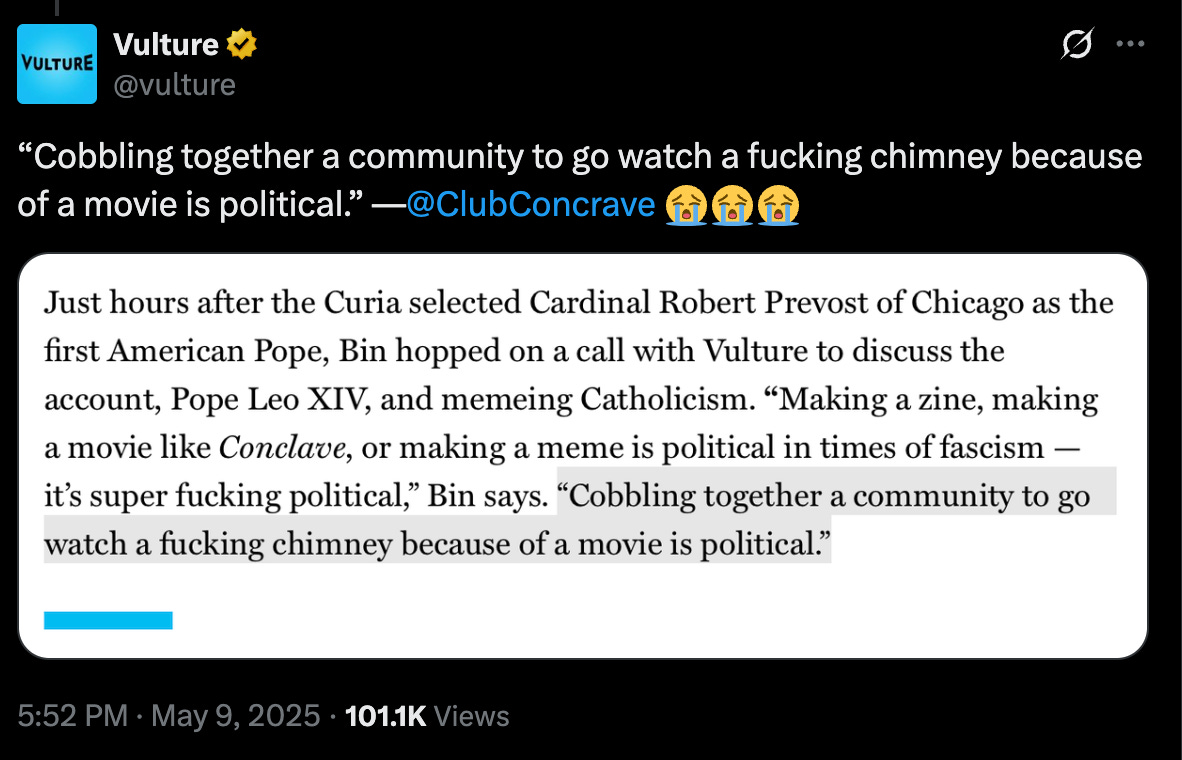Hi there. Welcome to Active Faults.
This is the closing issue of Alternate Universe, the review segment of this Substack that will become obsolete today. It should’ve gone out at the end of 2024 and it should’ve been a commentary on my favourite neiyu film of the year, Her Story (好东西). Instead, I’ve failed to meet that deadline so badly that a newer phenomenon has arisen, and a more timely piece needs to be written. Allow me to exonerate myself and say such is the nature of running a cultural publication. This is precisely how I promised to run it at the very beginning of this project: to stay relevant and versatile.
Let’s talk Conclave (2024), conclave (2025), the omission of her stories in conclave, the Pope Crave, and the burning urge to deconstruct invincible institutions that is the foundation of fandom.
The Ralph Fiennes-starring religious thriller had a humble beginning. Like many others, I can’t tell its subject matter from glimpses of its posters I caught in the Tube (male Handmaid’s Tale?) and, once I found out, can’t find it in me to care a whole lot as an agnostic. It documents the process of electing a new Pope within the Catholic church, as well as the power struggles between the cardinal candidates as they compete for the role. It had a quiet run at the theatres and it didn’t make a splash at the Oscars. Until a stroke of uncannily convenient marketing happened. Like many others, I became intrigued.
To my surprise, parts of the portrayal of Catholicism in Conclave were incredibly moving. Wanting faith is a human condition. A longing for God is a longing for the validation of our otherwise meaningless existence. A connection to the Church fulfils our needs of being loved and, more importantly, being able to love and therefore to feel alive. It’s why fans and celebrities will exist as long as we can breathe and eyes can see.
It’s an even bigger surprise to see that since I was last exposed to Catholicism (A-Level History textbooks and devotional poetry of the 17th century), the Church has gone…liberal. Even if we deduct Pope Francis from the cohort as an outlier of “excessive wokeism”, the Church in general has become more lenient on divorces, abortions, queer relationships, and the role of women in the clergy. I didn’t know that Catholicism now accepts wiggle room, and that there could be a spectrum. I didn’t know that ideological positioning led to factions among the cardinals, which essentially render the conclave a political wrangle that involves canvassing, lobbying, backstabbing and side-picking. Meanwhile, this infighting is still being sanctified into a divine trial out of which God’s most loyal “pontificator” will emerge. I laugh at how there is no way of pronouncing that word without sounding pretentious.
Throughout the conclave, the cardinals are “sequestered” to achieve complete isolation from the world. Rounds and rounds of ballots are cast in the Sistine Chapel until a majority is achieved, and it could go on for days. Latin beseechments are recited over and over for God to grant them an appropriate candidate. At night, they retire to a designated residence with blackout window shutters, underground bed chambers and zero mobile devices, heavily guarded by armed police. Of course, their food and accommodations are provided and managed by the nuns, who were almost entirely absent in the film.
There’s so much to satirise here.
The ridiculously elaborate, wasteful and archaic proceedings to the point of slapstick. The utterly profane machinations of senile men, under the guise of a childishly clandestine and supposedly transcendent process. Their “benevolence”, omnipresence and omnipotence versus the crimes they commit or choose to hide, and the silent nuns. The hypocrisy of rigging the election and staking their claim to papacy as natural and God-warranted. The coincidental timing of Pope Francis’ death, the occurrence of this absurdity in real time, and the absolute detachment of this minor non-event from real-life wars, genocides and crises. It’s extremely ironic. It’s meme gold. The internet pounced.
My social media became waterlogged with Pope jokes and pictures of red robes. “新教皇选举” (conclave) trended on Weibo and Bilibili videos explaining the factions of this year’s candidates surfaced.
I heard that global “old men yaoi” enthusiasts went from shipping characters in Conclave (2024) to shipping cardinals in conclave (2025). It is a glorious time to be online and witness such a moment, because I think this is not just shitposting. This deconstruction of Catholicism, its solemnity and everything the institution represents is where multiple shades of discontentment converge. It’s a focal point of tensions in the zeitgeist. It’s five resistance movements rolled into one. It’s why videos are made about Ding Zhen.
People poke fun at the conclave because it is also patriarchy, and conservatism, and a privileged class, and a futile nostalgia for a simpler time that turns a blind eye to the sufferings of the now. Paradiso is a scam because our attention span doesn’t last that long and we want instant gratification and it’s reserved for a few and also it will never come.
Out of this comes Pope Crave (a clear adaptation of the pop music update account Pop Crave). Originally a “hyperfixation parody account” dedicated to the Conclave (2024) that only a niche crowd follows, it shot to fame when the admins made it to the Vatican and started live-reporting the conclave on the ground. Not with the 5W of journalism, obviously, but with meme-filled tweets. They do not hesitate to be subjective either (it is later revealed that one of the admin is a human rights attorney).
Besides Pope Crave, more than 40,000 (including Harry Styles for some reason) gathered in St Peter’s Square to watch the chapel's chimney act as a beacon for each day’s polling results. Black smoke means no pope. White smoke means we hail “Habemus Papam”. It happened on the third day. Pope Crave announced the election of the new pope 4 minutes before the official Vatican account did, and a good 10 minutes ahead of all major news outlets. And lo and behold, the freshly anointed Pope Leo XIV waved to us from the balcony. The Chicago-born Robert Prevost is probably the first Pope to have had a Big Mac.
Pope Crave told us that he is not our best option, but his views are moderate enough to not be the worst. He’s still homophobic and transphobic, but that’s hardly surprising considering he’s still Catholic. He’s insistent on immigrant welfare and poverty alleviation. Just yesterday in his first Sunday address, he called for an immediate ceasefire in Gaza, Ukraine and India/Pakistan. To his friends, he is simply Bobby. He is a child in Vatican terms (69), a worldly linguist and a “bridge builder between two increasingly distant Catholic worlds”. He follows a Severance fan account on Twitter. He also hates JD Vance. He has even watched Conclave (2024). The memes didn’t stop when the conclave ended.
And now that Prevost won, the loser candidates we rooted for became even bigger icons. The left-leaning, Beatles-singing, pro-LGBTQ+ Filipino cardinal Tagle has had fan art drawn for him.
The anecdote he shared about sneaking snacks into the strictly no-foods chapel gave him an endearing “yappatron 3000” status.
His press conference after the conclave was compared to how K-pop idols would start a Weverse live stream after a concert. The other liberal candidate, Zuppi, had his own “fan cam”:

I can’t believe I’m typing this sentence, but Gen-Z netizens have just fanquanised Catholicism in order to deconstruct it as a political statement. Make the whole thing into a pop culture moment, “demote” it to the entertainment column, and the powerful is ridiculed. The status quo is interrupted for a flitting second. Articles like this one and this one only scratch the surface and do not realise the weight of this.
To circle back to what I intended to write about, the one thing that stood out the most in “Her Story” for me was the comedy. The film sketches out three lives burdened by their unique struggles. Tiemei the recently divorced single mum, with her thwarted aspirations, exhausting maternal duties, and tabooed sexual desires; Xiaoye with her self-loathe and her disappointing quests for romantic commitment; Momo and her search of identity in girlhood. Three women from three different generations, each reflecting a temperament of each wave of the feminist movement, outlining the history--herstory--of every march we walked and every glass ceiling we shattered. None of these are light subjects. Yet the humour made the resistance airy, permeable by light, and through airiness we laugh and bond and understand. That’s what happened with conclave-gate, and that’s where activism of the next generation is heading. I want to be hopeful about its transformatory potential.
I now have words for what I vaguely sensed, 4 years ago, when I first looked towards fanquan and the implications of its vitality. At its heart, to fan is to form an opinion and a stance. Whether that opinion leads to devotion or derision, individuality and agency emerge. It has to matter somehow.




























